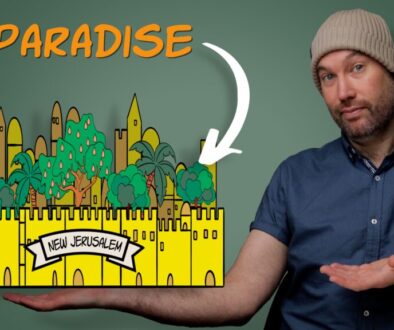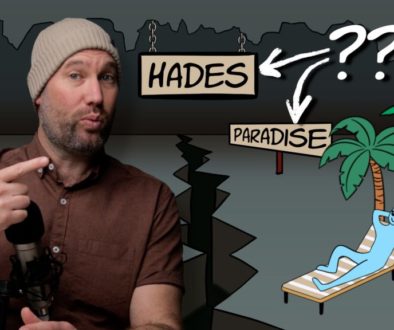The Church Of The Holy Noun
** This post is part 2 of the post Let’s Get Metaphysical, Metaphysical. If you haven’t read that one read it first here **
“Down with the DC Talk, d- d- down with the DC Talk!”
I remember when my family bought our first ever CD’s. I was 13 and we were preparing our house for sale to move to another area. Most evenings we would all work on various jobs while listening to our freshly purchased music in it’s new, technologically advanced, cutting edge format. My main job was scraping old paint off of door frames. And the two new CD’s that received highest rotation were Free At Last and Jesus Freak, both by the band DC Talk.
My brother and I can still sing most of the words from both albums off by heart. Including (or even especially) all the raps. Here’s a verse from one song off the album Free At Last, purely from memory:
Pullin’ out my big black book, cos when I need a word to find that’s where I look
Luv Is A Verb – DC Talk
So I move to the L’s quick fast in a hurry, threw on my specs thought my vision was blurry
I looked again but to my dismay it was black and white with no room for grey
You see, a big “V” stood beyond my word and yo that’s when it hit me
That love is a verb
Ok, so I checked the official lyrics after writing that and I was pretty close. In the first line it’s supposed to be “when I need a word defined” not “when I need a word to find“. Which makes a lot more sense. For 24 years I’ve been singing it wrong.
But the point of the whole song is exactly what the title says, that Luv Is A Verb. Why did DC Talk feel the need to use their perfect blend of rap, rock and soul to point out that love is a verb? Because they saw that too often the world was treating love as a noun.
Love Is A… Noun?
For those who didn’t do that well in English at school let me give you a quick refresher on the 3 main categories of words we use.
Noun – A noun is a word that denotes an object, a person, place or thing. For example, dog is a noun. One key thing about nouns is that usually they can be possessed (not specifically demonic possession, I mean like being owned). For example I can have (posses, own) a dog.
Adjective – An adjective is a describing word, used to describe a noun. (An adverb is used to describe a verb). For example, fluffy is an adjective that I can use to describe the noun dog. So I can say, “I have a fluffy dog.”
Verb – A verb is a doing word, it denotes an action. For example, bite is a verb. So putting all 3 together I can say, “I have a fluffy dog who likes to bite little children.”
DC Talk claims that love is a verb, and I agree. Ironically, most definitions of love claim that it’s a noun, like this dictionary here. And this article about The Parts Of Speech actually uses love as an example of a noun. It says:
Noun – A noun is generally defined as a person, place, or thing; however, ideas are also nouns. For example, love is not a tangible thing that can be seen or held, but clearly it exists, so it is a also a noun.
Do you see what is happening here? In my last post I pointed out that in Plato’s philosophy of metaphysics “he gives abstract concepts their own disembodied reality. I.e. Beautiful is real by itself, without being attached to any object.” That’s exactly what is happening here – “Ideas are also nouns.”
According to the article “The Parts Of Speech” love is a noun because it exists. According to DC Talk (and, I would argue, the Bible) love is a verb because it is done. It is lived out. Embodied. Enacted. It only exists because it is actively embodied.
To Have Or To Do?
So let me trace a few thoughts together:
1. Plato thought that abstract concepts or ideas had their own reality.
2. Plato’s philosophy has woven it’s way through both Western philosophy and Christian thought.
3. In modern language we treat ideas or concepts as nouns, meaning that we give the concept it’s own disembodied reality.
4. Nouns are things you have, verbs are things you do.
The modern concept of love is more of a noun, something you have. God’s concept of love is more of a verb, something you do.
I’ve oversimplified here and made it black and white, when of course it’s more dynamic than that. But I’m overstating the distinctions to make a point. The language we use affects how we understand things, and how we understand things affects how we interact with them.
I’ve used “love” as the example so far, but love isn’t the main topic I want to discuss. I believe that Christians have noun-ified a lot of the main ideas in our faith. We’ve given them more reality as philosophical concepts than as things that are embodied and lived out. One of them, that I’ve taken aim at previously, is “relationship”.
Is relationship with God a noun or a verb? Is it primarily something we have or something we do? (Again, I’m oversimplifying the distinction to make a clear point).
A little while ago I spent quite a bit of time looking up the websites of dozens of prominent churches and reading their Statement Of Faith, or “What We Believe” sections. I also spent countless hours researching “What is the gospel?” and “What is Christianity?” which is how I put together The Common Story. “Relationship with God” was a major theme everywhere I looked.
And with few exceptions, I found that in modern Christianity our “relationship with God” is treated primarily as a noun in the way we talk about it.
What do I mean by that? I mean that almost exclusively the discussions about our “relationship with God” referred to it as something to have, not something to do. And because it’s something you have it’s something you can get. So in the Common Story, a generic, undefined “relationship with God,” as a noun, is what we need to get. And Jesus is the one to get it for us.
Nounifying Sin
Sin is another one. We start off talking about it as a verb, and then change to a noun. We start by saying, “Because you do wrong things, which is sin, you are alienated from God.” Then suddenly sin shifts from a verb to a noun and becomes something we have. So that being made right with God doesn’t have anything to do with not doing sin but is all about not having sin. Because Jesus takes it away. Not the doing sin part, the having sin part. As a disembodied metaphysical entity.
You can still do sin, but not have sin, and that makes God happy. Right? Because “God can’t look on sin” and so, because Jesus paid for your sin now “when God looks at you he doesn’t see your sin, he sees Jesus.” So now we can get into heaven. We call it “grace”. This video here is a great example of how we’ve been taught to view it:
But as pervasive as this way of thinking is, it’s actually quite a way off. More on that in another post.
This leads me to another, and probably the most central, overly noun-ified concept in Christianity.
Salvation.
What? Salvation? I Don’t Get It…
How do we talk about salvation? Is it primarily something to live in, participate in, something that’s active… or something to have? In the Common Story, salvation is absolutely a noun. It’s something you get. Look at how we talk about it. The whole deal with “law vs grace” (in the way we talk about it, which is not actually how the Bible talks about it) is a question of how do we get salvation? Do we earn it, or is it freely given to us? And once we get it, can we lose it?
Put simply, our common idea of salvation is essentially a ticket to heaven.
So the big question is, how do you get your ticket? Do we have to earn our way in, or can we get a ticket for free? And if we can get a free ticket, how are those tickets distributed? How do I get mine? People with sin can’t get in, cos God can’t look on sin. So how do we sinners get in? Is Jesus giving out fake I.D.’s to sneak us in?
These are all wrong questions.
Because salvation is not a noun. It’s not exactly a verb either, it’s something else, but that’s for another post. The point is that as long as we think salvation is something to get then our biggest concern is how to get it. We need to completely reframe our thinking about what salvation is.
I could go on with several more concepts that we have overly noun-ified in Christianity. But hopefully, even though these last 2 posts have been quite philosophical, you can grasp where I’m coming from. Let me give a brief summary of what I’ve been deconstructing, then I’ll lay a quick foundation of reconstruction, which is where all this is ultimately headed.
What’s The End Game, Really?
Christianity has taken on too much abstract, philosophical thought, rooted in metaphysics, as our way of viewing the Christian Story. We’ve taken major concepts – like relationship, sin, salvation, and others – and given them their own disembodied reality. And we think these disembodied realities are more real than the reality we live in. I’ve used the language of nouns and verbs to paint the contrast in our thinking. We think of these concepts as more real in their noun form than in their verb form.
On the other side of the same coin is the fact that we’re telling the Story wrong. These two sides, abstract thinking and wrong storytelling, work in tandem. We’ve made the story about how to get into heaven. And in that version of the story, since we have sin we are unacceptable to God and can’t get in. So in a story where getting sinners into heaven is the end game, Jesus’ whole goal is to make us appear acceptable to God so that we can get past the Pearly Gates.
But I want to contend that the Bible tells a much different Story. One where things like relationship, sin and salvation are far less abstract and metaphysical, but rather deeply grounded and embodied in this reality, both physically and spiritually.
Because the end game isn’t to get us into heaven. The end game is to make the world right again. The problem with sin isn’t primarily that it makes us unacceptable to God. The problem with sin is that it has corrupted the world. God offers us forgiveness through Jesus not as a free pass to heaven, but as an act of reconciliation. Forgiveness is not the end in itself, but a means to open up relationship with God again. Not some generic, undefined “noun” relationship, but one in which we are transformed into the people that God originally intended us to be – people who will rule God’s world on his behalf and according to his ways.
When Jesus comes back he won’t be taking us to heaven. We’ll be resurrected to rule with him on a new earth. One that is joined with a new heaven, like it was in the Garden of Eden. Where God himself will dwell with us. An uncorrupted world. That’s the end game.
There’s More To The Problem
So the “Problem” part of the Story is essentially that God’s world has become corrupted. And his solution isn’t just forgiveness, but he’s actually working to un-corrupt the world. Not just metaphysically, but in reality.
But there’s more to the Problem – to the corruption – than just sin. And so there’s more to the Solution than just dealing with sin. In the next post we’ll get back to the Story and we’ll start looking at a major factor that is not very well understood and gets almost no airtime in the Common Story: the rebellion of spiritual beings.


